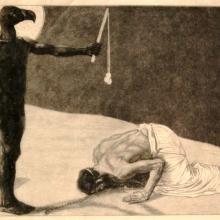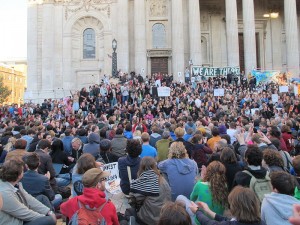Mammon

Photo via YouTube / PBS Newshour
Pope Francis’ strident critique of “unbridled capitalism” has turned heads across the globe. Ahead of his upcoming visit to the United States, American politicians, religious leaders, and laypeople are eager to hear how Pope Francis thinks about economics.
Economics correspondent Paul Solman spoke with Jim Wallis and others in a segment for PBS Newshour about why the pope wants us to stop worshiping capitalism.
Jim Wallis explained how Pope Francis’ critique of capitalism matches God’s vision for the world, as well as the ministry and example of Jesus:
On a Greenwich Village street where male prostitutes seeking customers shout out their dimensions, I walked past an open but empty church on my way to the subway.
In times past, flocking to church on Sunday morning was a beloved family routine, even here in bad old Gotham. Now they’re trying nontraditional worship on Sunday evenings.
It’s a struggle, both here and elsewhere in the 21st-century Christian world. Buildings with “beautiful stones and gifts dedicated to God,” as Luke described the temple in ancient Jerusalem, are falling into disuse and disrepair — not because Caesar attacked and took revenge on an alien religion, but because the world changed and gathering weekly in “Gothic piles” no longer seems necessary for finding faith.

Der Mammon und sein Sklave. Holzstich, 1896 via Wiki Commons, http://bit.ly/zom5Df.
Tuesday's New York Times carried a thought-provoking op-ed by David Brooks called "The Materialist Fallacy." I recommend that you read it: it's only 764 words long. Brooks argues that "in the half-century between 1962 and the present, America has become more prosperous, peaceful and fair, but the social fabric has deteriorated." This is not just because of job loss (the liberal explanation) or government intrusiveness (the libertarian explanation) or "the abandonment of traditional bourgeois norms" (the neo-conservative explanation).
It has more to do with declining social context and social capital, says Brooks, who never met a financial capitalist he didn't like. He really likes Charles Murray's new book, however: Coming Apart: The State of White America, 1960-2010. (If you're not up for the 416-page book, you might want to read Brooks's January 30 column in praise of it.) Both authors worry about nefarious social forces that are driving a wedge between rich and poor, productive and non-productive, law-abiding and outlaws.
Brooks is partly right, and so are his critics. Yes, there's a rip in our social fabric. Yes, it is caused or made worse by job loss, ill-advised government programs, and shifting (or abandoned) values. Yes, it diminishes social capital and impoverishes social context. But also, Mr Brooks, and perhaps fundamentally, our decaying social fabric is the direct result of our enthusiastic worship of Mammon--the love of money that is the root of all evil (1 Timothy 6:10).
I don't need to remind anybody about rapacious financiers, bloated CEOs, unscrupulous lobbyists, and corrupt politicians. But there were plenty of those in the 1890s and the 1920s, and, as Brooks points out, the social fabric still stayed more or less intact back then. Even two World Wars and a Great Depression didn't unravel it. People still finished school, still got jobs, and still got married before having children, if not always before getting pregnant. Why did things start to break down in the 60s?

On Sunday (10/30), the Anglican Bishop of London, the Rt. Rev. Dr. Richard Chartres, met with Occupy London protesters who have encamped for several weeks now on the ground of St. Paul's Cathedral in London, in an ongoing attempt to get the demonstrators to leave church grounds.
Chartres wants the Occupiers to vacate cathedral property and stopped short, in an interview with the BBC yesterday, of saying he would oppose their forcible removal. Other British clergy, however, are rallying behind the demonstrators, saying they would physically (and spiritually) surround protesters at St. Paul's with a circle of prayer or "circle of protection."
Scripture constantly should be challenging our assumptions about our lives and in every aspect of society. Transformation is needed on a personal and also a political level. Scriptural priorities shouldn't be glossed over in order to protect political ideologies and comfort zones.
If we believe that what Jesus taught remains just as relevant today as it did when he physically walked among us, then it should still be a comfort to those on the margins of society and offensive to the wealthy and powerful. That doesn't mean that the wealthy and powerful can't be good and faithful followers of Christ, but Jesus did warn them that their walk will be a hard one. Wealth and power bring unique and difficult temptations ... If you never feel uncomfortable when you read the Gospels then you aren't paying attention.
As per usual, on Friday, we had all sorts of Buy Nothing Day festivities (check out the video here). But that's not what I want to talk about. I read recent posts on consumerism and Buy Nothing Day by Eugene Cho and Rachel Anderson here on God's Politics, and I admire the optimism and nuanced critiques. But this past weekend folks around the world stared in embarrassment, pity, and horror as people killed each other for bargains –- literally.
As per usual, on Friday, we had all sorts of Buy Nothing Day festivities (check out the video here). But that's not what I want to talk about.

